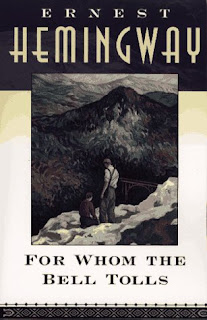This month's selection for our book club was For Whom the Bell Tolls, by Ernest Hemingway. It was my turn to choose, and I broke group convention to select a book I had read previously, some 20+ years ago, in my college days.
Group opinion on the book was mixed. On one end of the spectrum was myself, who absolutely loved it and read it through twice in the time between group meetings. On the other was Jim Kidwell, who found the book to be so laborious that he had only gotten halfway through it. The opinions of our other two constituents, Will Johnson and Kurt Kemmerer, fell within those two poles. Both Will and Kurt enjoyed the book, but were less enthusiastic about it than was I.
I stand by my assessment.
Because this book, to me, is Ernest Hemingway's finest novel. He wrote it when he was in his late thirties, after having served as a war correspondent during the Spanish Civil War. It is a novel written by a great writer at the absolute height of his powers.
It is a story of a young American man, Robert Jordan, who is assigned the mission of destroying a bridge in the Fascist-held Spanish foothills during la guerra civil de España. As Robert Jordan goes about his task, he enlists the help of a band of guerrilleros.
In telling the story, Hemingway paints a portrait of the Spanish people, in all their nobility and squalor. Through each of the characters, from drunken, deadly Pablo, to passionate Agustín, to noble Anselmo, to grim, remorseful Lieutenant Berrendo, Hemingway provides another facet through which to view the Spanish character. The love Hemingway had for la gente is apparent.
There are three main characters.
- Robert Jordan, who seems, at least to some extent, to be based on Hemingway, himself. There is an eerie passage in which Robert Jordan reflects on the suicide death of his father, thinking "you have to be awfully occupied with yourself to do a thing like that." When one remembers that, some twenty-five years after he wrote those words, Ernest Hemingway shot himself in the head with a shotgun, that passage causes one to pause and consider...
- Maria, the survivor of Fascist atrocities, who has been rescued by the guerrilleros and now finds herself in love with Robert Jordan. Maria, I think, represents the noble heart of Spain. She has been savaged by war, but endures and begins to heal.
- Pilar, the woman of Pablo, who some have speculated was modeled after Hemingway's writing mentor, Gertrude Stein. I wouldn't know nor care to speculate. But I will say that the character, Pilar, is one of the most memorable fictional characters of all time. Honest, wise, foul-mouthed, strong, and kind. Pilar has gypsy blood and can read people's fates from the palms of their hands. She is a flawless judge of character. She enforces her will with her scathing tongue. She is larger than life.
The dialogue is written in a style that I, as a Spanish speaker (more or less), really enjoyed. Hemingway uses the archaic pronoun "thou" to express the "tú" form of Spanish. (Which, of course, is entirely accurate.) He also constructs sentences in such a way as to emulate sentences constructed in Spanish. For example, in English, one might say "I've got to run," while in Spanish one would say "Hay que necesito correr," or, literally "There is that I must run."
Early in the novel, there is a passage wherein Pilar relates to Robert Jordan and Maria the story of the day Pablo and Pilar led the action to take their village from the Fascists, a year before, at the beginning of the "Movement." It is a bone-chilling, horrific, and utterly gripping story. If you read the book remember what I say here! The story begins with Pilar saying "It was early in the morning when the civiles surrendered at the barracks."
I can't recommend this book highly enough. It is fiction, but it is not speculation. It is truth. It is one of the finest novels I have ever read.

2 comments:
I absolutely concur. An absolute marvel of literature. Everyone should read this book.
I agree that this book explores themes of love, war, and loss in an impactful way.
Post a Comment